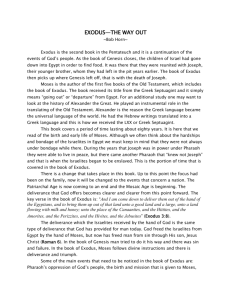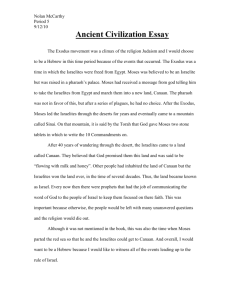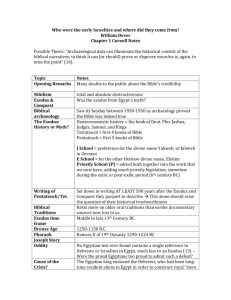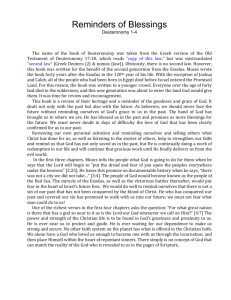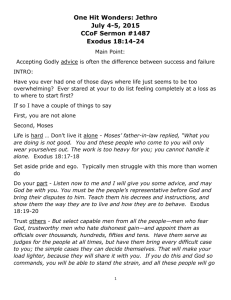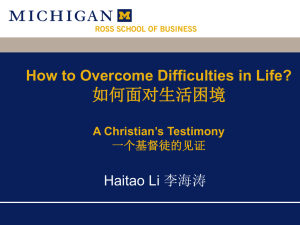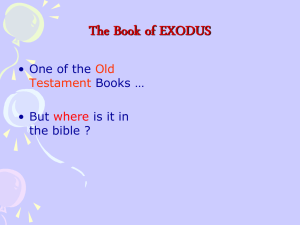Jonah Takes to the Sea (1:1-10)
advertisement
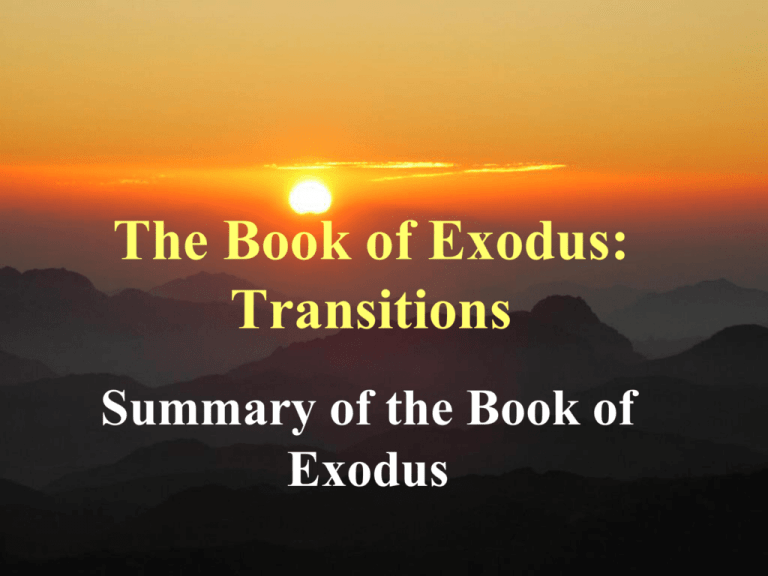
The Book of Exodus: Transitions Summary of the Book of Exodus Announcements – Wednesday, 02 Jun 10, starts the summer series “in the grace and knowledge of our Lord and Savior Jesus Christ” Prayer List • List “in the grace and knowledge of our Lord and Savior Jesus Christ” Exodus Week Date Topic 1 10 Mar 10 Exodus – Transitions: An Introduction 2 17 Mar 10 God’s Preparation of Israel: Exodus 1-4 (Ben) 3 24 Mar 10 God’s Sovereignty: Exodus 5-11 4 31 Mar 10 God’s Redemption: Exodus 12:1-13:16 5 07 Apr10 God’s Completion: Exodus 13:17-15:21 6 14 Apr 10 God’s Instructions to Israel: Exodus 15:22-18:27 7 21 Apr 10 Mosaic Covenant: Exodus 19:1-24:11 8 28 Apr 10 Dwelling Among His People: Exodus 24:12-31:18 9 05 May 10 Breaking/Renewing the Covenant: Exodus 32-34 10 12 May 10 Senior Blessing Night – No classes 11 19 May 10 Israel’s Worship: Exodus 35-40 12 26 May 10 Exodus – Transitions: A Summary Today’s Objectives • Review last week’s lesson (Genesis 35-40) • Review the transition from Genesis to Exodus • Provide an historical background of Exodus along with a timeline and maps • Cover key points of Exodus • Provide a chapter-by-chapter overview • Provide a summary of key events in each chapter • Review historical lessons • Review lessons from the New Testament that find roots in the book of Exodus Last Week’s Class • Reviewed lesson from 05 May 10 (Israel’s sin) • Reviewed historical maps of the region • Learned how the people’s contributions help build the tabernacle • Learned that the people bring what the builders need • Learned about the tabernacle components and raw materials used in construction • Learned about the priests’ clothing • Saw the finished tabernacle presented to Moses • Learned about the building and consecration of the tabernacle and watch God descend and dwell there Transition from Genesis to Exodus • • • • • • Creation of the world First human family Spread of evil World wide flood – God’s punishment Division of mankind into nations and languages God chooses the fathers of the future nation of Israel – 12 men from which the 12 tribes are created • Four Generations – grow from two to 70 people • But did the Israelites get to Egypt? – Descendents of Abraham relocate from Canaan to Egypt Children of Jacob (Genesis 30:1-24, 49:1-27) Facts about Exodus • Second book of the Hebrew Bible • Second of five books of the Torah or Pentateuch – Torah is the law • Meaning of the word Exodus – Greek exodos, meaning departure, taken around 300 BC – Hebrew title is Shemot, meaning “and these are the names” • Exodus, along with the other four books of the Pentateuch, are attributed to Moses Timeline • 1 Ki 6:1 states Solomon built the Temple in the fourth year of his reign, 480 years after the Exodus or 967 BC • Date of Exodus is approximately 1447 BC • Two possible Pharaoh’s of the Exodus – Amenhotep II (1450-1425 BC), son of Thutmose III – Thutmose III • Moses was 80 years old when he spoke to Pharaoh (Ex 7:7) – Therefore, Moses was born sometime around 1527 BC – Thutmose I reigned during Moses’ birth Ref: Constable Rulers of Egypt in Exodus • Ahmose I (1570-1548 BC) – Founder of the New Kingdom after the expulsion of the Hyksos rulers, consolidated borders – Initiated temple building projects • Amenhotep (1548-~1528) • Thutmose I (~1528-1518 BC) – – – – Meaning “Born of Thoth” Thoth the Egyptian god of wisdom Moses’ early childhood Therefore Moses would be Egyptian “Born of” and Mu meaning water Rulers of Egypt in Exodus • Thutmose II (1518-1504) – Moses from about age 8 until 21 • Thutmose III (1504-1450) – – – – Queen Hatshepsut (1498-1483, co-regency) He is called the Napoleon of Ancient Egypt He created the largest empire Egypt had ever seen Moses kills Egyptian; identifies with his brethren (Heb. 11:24-26) then leaves Egypt (1486 BC, Ex 2:11-15) – Moses dwells in Midian 40 years (Acts 7:30) King of Upper & Lower Egypt Menkheper Ra Son of Ra Thetmess Rulers of Egypt in Exodus • Amenhotep II (1450-1425) – – – – – – – Seventh pharaoh of the 18th Dynasty Son of Thutmose III (but not the eldest son) Successful military campaigns Considered to be the Pharaoh of the Exodus Firstborn slain in the last plague (Ex 12:29) His eldest son did not follow him to throne. over, after “Dream Inscription of Thutmose IV” • Notes – Archaeologists give us great detail on the Pharaohs of Moses’ time – Mummies have been found for each of the Pharaohs Amenhotep II Key Points of Exodus • God’s miraculous rescue of Israel from Egypt through Moses • Covenant law given at Mount Sinai • Established the tabernacle as the place of God’s presence and Israel’s proper worship • God’s revelation of Himself and His character • Israel’s tendency to complain and rebel against God • God’s judgment and mercy toward His people when they rebel • Exodus narrates the very crucial matters that define Israel as a people in relationship to God New Testament Implications • The Law given at Sinai was God’s Law for Israel – Continued until Christ died on the cross (Col 2:14). We now live under the Law of Christ (He 7:12; 8:6-13) • God cares for His people – – – – Heard the cry of the Israelites (2:23-25) He sent them a deliverer (4) Guided them (13:21) and provided for them (16) Protected them (17) • Jesus is our Passover – Blood of the perfect lamb (12:5) – Jesus is the perfect Lamb (John 1:29, 1 Pet 1:18-19) – Blood of the lamb sprinkled over the door (12:7,13) New Testament Implications • God delivered Israel, as He delivers us from our sin – God delivered the Israelites from bondage in Egypt – He delivers us from bondage to sin and Satan – Review 1 Cor 10:1-13 • Purpose of the Sabbath – Reveals when the Sabbath was given and for whom it was intended (Mt. Sinai – see Neh 9:13-14) – Given only to Israel (Ex 34:27-28), memorialized deliverance from Egypt (Deut 5:15) • Application of symbolism – Help to understand messages in NT (Col 2:16-17, Heb 8:5 and 10:1) Chapter by Chapter Exodus Exodus Ch. 1-2:25 • Growth of the Israelite nation – Moses is born and grows up in the Pharaoh’s house – Later sides with his own people, leaving the life of prosperity and comfort – Like Moses, Jesus left his high position (Phil 2:5-7) • Oppression of the Israelites by the Egyptians. – King Herod orders all the Hebrew boys under the age of two to be murdered – Exodus 1:22 is the OT parallel to Matthew 2 Exodus Ch. 3-6:27 • Call of Moses – An angel of the Lord speaks to Moses at Mt. Horeb through a burning bush – Most likely synonymous with Sinai, the scene of the giving of the Law, and also of Elijah's vision • Commission of Moses – Deliver God’s people from the oppression of Egypt – Moses feels like he is not adequate enough to handle such a task and wants God to send someone else instead Exodus 6:28-15:21 • Confrontation with Pharaoh • Nine plagues, strike at the heart of idolatry – – – – – – – – – Water turned to blood Frogs Gnats Flies Livestock Boils Hail Locusts Darkness • And a tenth, death of the first born Exodus 6:28-15:21 • Weaving together of the institution of the Passover with the narrative of the tenth plague – Passing over the destroying angel (also 1 Cor 5:7) – Has been related to the Lord’s Supper as a remembrance of the price paid for our escape from sin • Jews escape slavery in Egypt – Parallel with escaping slavery of sin • Parting of the Red Sea – God’s people saved through water – See 1 Cor 10:2 Exodus 15:22-18:27 • Journey to Mount Sinai – Not to soon after all these miraculous things God does, the Israelites start to grumble and complain! NO WATER!! – Then they grumble about not having enough food – These moments of grumbling and lack of faith are a foreshadow of what is to happen throughout Israelite history Exodus 19:1-24:11 • The Covenant is given at Mount Sinai – God combines his deliverance of Israel “on eagles wings” with the call to obedience and his adoption of them as his own treasured possession • 10 Commandments are given – Shows the fundamental responsibility to God and each other – Way of life is completely changed • Promise of divine guidance and conquest of the land of Canaan – Predicated upon their obedience to God • Covenant is ratified Exodus 24:12-31:18 • Instructions regarding the Tabernacle – Place of God’s presence among the Israelites – Very detailed instructions on construction/contents – Brings honor to God and dignity to how they worshipped Tabernacle – Structure and Dimensions Exodus 32:1-34:35 • Rebellion – Moses goes up Sinai to receive more instructions – His brother Aaron and the Israelites remain below • Breaking of the Covenant – People grow weary – People construct idols and begin worshipping them • Renewal of the Covenant – Moses intercedes, saving the Israelites from destruction – Tablets provided again Exodus 35:1-40:38 • Tabernacle – Construction – Furnishings – Further highlights the significance of the Tabernacle as a place of God’s presence among the Israelites • Tabernacle is set up and the glory of God descends – Reminder of God’s presence with the people Review • Reviewed last week’s lesson (Genesis 35-40) • Reviewed the transition from Genesis to Exodus • Provided an historical background of Exodus along with a timeline and maps • Covered key points of Exodus • Provided a chapter-by-chapter overview • Provideed a summary of key events in each chapter • Reviewed historical lessons • Reviewed lessons from the New Testament that find roots in the book of Exodus
